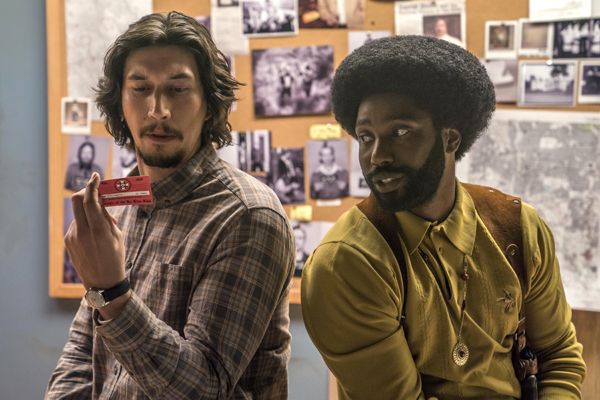Based around a 2014 memoir, director Spike Lee labels his new film on screen in his inimitable fashion: “Fo’ Real Fo’ Real Shit.”
Many of its most absurd situations are factual; some sympathetic characters are fictionalized; some similar incidents happened later. But Lee, at the suggestion of Jordan Peele and the other producers of Get Out, reworked an earlier script with his writing partner, film professor Kevin Willmott, to powerfully and yet sometimes humorously depict a fascinating tale that encompasses the country’s racial and cinematic history from 1915 to 2017.
Over a classic scene from Gone with the Wind (1939), Alec Baldwin narrates the opening prologue as “Beauregard” as he rehearses and films a racist rant. His white power message in black-and-white recalls the archival footage of segregationist Alabama Governor George Wallace in Lee’s 4 Little Girls (1997). This sequence also plays on Baldwin’s well-known Trump parodies on Saturday Night Live, with a jab at Alabamian Attorney General Jeff Sessions’s middle name. Clips from D.W. Griffith’s The Birth of a Nation (1915) are seen here and throughout film in an accurate representation of how the silent movie not only became a force for revitalizing the Ku Klux Klan in the 1910s and 1920s but continued to be used as a recruiting tool beyond the southern United States for its celebration of white supremacy against the imagined threats from atrocious black stereotypes.
The perspective then shifts to the snow-capped Rocky Mountains nestling Colorado Springs in the 1970s. There, Ron Stallworth (John David Washington), sporting a full-on Afro, is interviewing to be the first African American in the police department. Portrayed almost exactly as Stallworth recounts in his memoir, his onscreen counterpart calmly responds to questions on his attitudes and predicted behavior. After he’s hired, Ron is stuck in the file room—and comes up against the racist attitudes from a few fellow officers—until there’s an opportunity that only he can fulfill.
Kwame Ture, formerly Stokely Carmichael, known for espousing the Black Power movement and the Black Panther Party, is coming to town to give a lecture, and the nervous higher-ups need someone to go undercover and report back on whether his revolutionary rhetoric will stir up trouble. As a result, Ron meets—and flirts with—the evening’s moderator, the president of the Colorado College Black Student Union, Patrice Dumas (Laura Harrier), a fictional kindred spirit of Angela Davis in style and attitude.
This scene, set in a popular nightspot, lets director Lee loose with an incongruous, but joyous, musical number that celebrates 1970’s R & B, as the attendees sing along and line dance to the hit “Too Late to Turn Back Now” by Cornelius Brothers and Sister Rose. (On a date, Ron and Patrice will continue down the black cultural road, such as comparing their favorite blaxploitation flicks.) Corey Hawkins, as Kwame Ture, delivers a rousing speech raising black consciousness, compiled from Ture’s actual works, including his criticism of the “Tarzan” movies for belittling Africans and thus shaming young African American viewers.
Ron assures the department that the audience reactions were only rhetorical, and he seizes the chance to join the intelligence unit. With Colorado’s long history of support for such groups as the KKK and the Posse Comitatus, the police are charged with keeping an eye on any possible disruptive activities. While surveying the local paper, Ron is so surprised to see a KKK recruitment ad that he responds by calling the listed number and leaving a message, though using his own name. He is more startled to get a response and engage with the local representative of “The Organization,” Walter Breachway (Ryan Eggold). The officer is further shocked to easily reach on the phone the grand wizard, David Duke (Topher Grace), just at the time the three-piece suit-wearing Duke is shifting his electoral ambitions from losing with the Democrats to winning as a Republican in Louisiana—and who brags to Ron how he can always detect a black caller’s voice.
Going undercover to Klan meetings is, of course, impossible. So Ron negotiates with his bosses to have a narcotics officer pose as him, while the real Ron listens on through a wire. With some dramatic license, as Stallworth has never identified his alter ego, Philip “Flip” Zimmerman (Adam Driver) attends meetings acting as Ron and reports back to headquarters. The implicit humor in this situation stops in the face of the Klan members’ vicious racism, which is also accompanied with such virulent anti-Semitism that Flip’s dormant Jewish identity perks up in reaction. Nevertheless, Flip impresses the none-too-bright local branch members. Ominously (and factually) in the background at meetings, there are men who are active duty military.
The potential for trouble rises when Duke confirms on the phone that he will be visiting Colorado Springs to formally induct new members, including one “Ron Stallworth,” and the police chief can’t resist assigning the real Ron to be Duke’s bodyguard. The humor in this setup is movingly shortened with split screen/alternating views of simultaneous contrasting events. While the costumed KKK members raucously enjoy a screening of The Birth of a Nation, the Black Student Union hosts a more somber meeting. Activist/entertainer Harry Belafonte, in the fictional role of Jerome Turner, provides spellbinding gravitas by relating an eyewitness account of the lynching of Jesse Washington in 1916 in Waco, Texas, documented with photographs by Fred Gildersleeve.
Suspense builds as Ron and Flip face possible exposure and rush to thwart trouble. While the climactic incident is fictional, a participant from this coterie of the Klan was the getaway driver for the assassin of Jewish talk-show host Alan Berg a few years later. As the investigation succeeds, Ron has more camaraderie with his co-workers than he actually felt, but the emphasis here is on the “few rotten apples” instead of the real-life systemic hurdles to his career.
Just as Malcolm X (1992) began with the beating of Rodney King by four Los Angeles cops, Lee concludes with very pointed footage from the white supremacists’ Unite the Right weekend in Charlottesville, Virginia, exactly one year before the film’s U.S. release date. Still upsetting are the repeated images and chants of that torch rally, President Trump’s equivocation, and a car ramming into counterprotesters, killing one, Heather Heyer. (Lee personally called Heyer’s mother for the approval to use her daughter’s image.) Duke’s press conference that weekend, full of the phrases used in the film’s dialogue, provides the chilling link between past and present realities. There is far more truth in this tumultuous film than fiction.

















This is an insightful review, covering the main topics so well, without spoiling the suspense. It added info about which parts were fictional, which I appreciated. Thanks for your excellent writing.